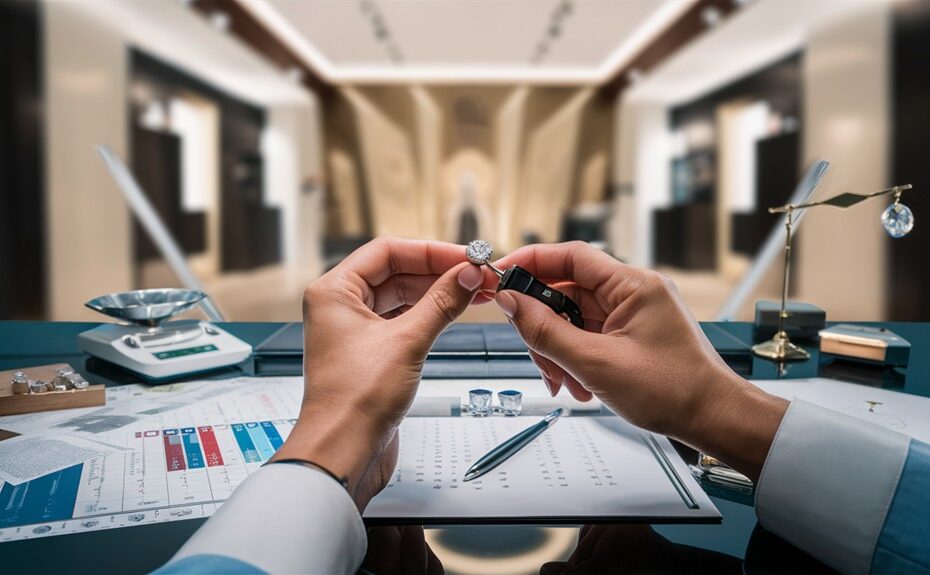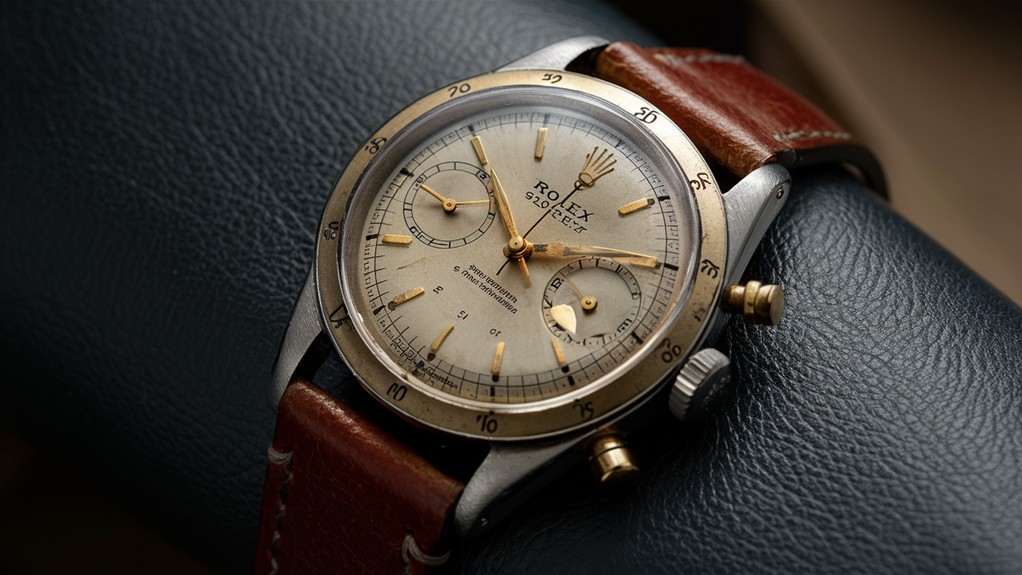You've probably wondered about the true value of that family heirloom or that stunning piece you've recently acquired. The world of jewelry valuation can be intricate and overwhelming, but it's crucial for insurance, estate planning, and potential resale. As you consider the prospect of having your precious items appraised, you'll find that understanding the process is key to ensuring you receive an accurate assessment. But what exactly goes into a professional jewelry valuation, and how can you prepare for one? The answers might surprise you and could greatly affect the perceived worth of your cherished pieces.
Our Highlighted Points
- Appraisals determine jewelry's replacement cost based on metal purity, gemstone quality, craftsmanship, and market trends.
- Documentation, including ownership proof and gemstone certifications, is crucial for accurate valuation and insurance coverage.
- Specific appraisals for rings, watches, diamonds, and gemstones require detailed information and relevant certifications.
- The appraisal process involves examining condition, evaluating gemstones (4Cs), analyzing metals, and assessing craftsmanship.
- Certified appraisers with specialized education and continuous training provide credible valuations adhering to ethical standards.
Understanding Jewelry Appraisals
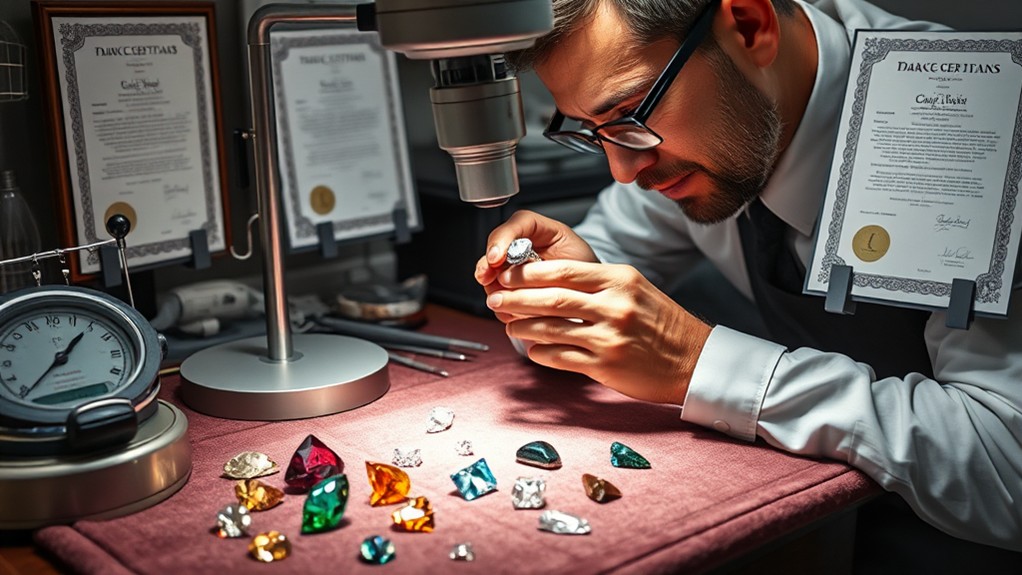
In today's dynamic jewelry market, understanding the appraisal process is fundamental for any jewelry owner. A jewelry appraisal is a professional assessment conducted by certified appraisers to determine the value of your precious pieces. This evaluation serves multiple purposes, including insurance coverage, estate planning, and potential resale.
The appraisal process involves a thorough examination of your jewelry's specifications:
- Metal purity
- Gemstone quality and authenticity
- Craftsmanship and design
- Unique features or historical significance
Factors that influence jewelry value include:
- Market trends and demand
- Rarity of materials
- Brand reputation
- General condition
It's imperative to understand that the appraised value typically reflects the replacement cost, not the resale value. This distinction is significant when considering insurance coverage or potential sales.
Documentation plays a critical role in the appraisal process. Providing proof of ownership and certificates of authenticity can greatly improve the credibility and accuracy of the evaluation.
Documentation for Jewelry Valuation
In regard to jewelry valuation, proper documentation serves as the backbone of a thorough and accurate assessment. To guarantee a detailed appraisal, you'll need to gather several key documents:
- Proof of Ownership and Authenticity
- Original receipts
- Certificates of authenticity
- Gemstone certifications (e.g., GIA, AGS)
- Detailed Specifications
- Metal type and purity
- Gemstone quality (cut, clarity, color, carat)
- Manufacturing details (designer, brand, hallmarks)
- Visual Documentation
- High-resolution photographs from multiple angles
- Close-ups of hallmarks, settings, and unique features
- Provenance Documents (for vintage or antique pieces)
- Ownership history
- Notable events or historical significance
These documents not only aid appraisers in their assessment but also play an essential role in insurance coverage.
Accurate documentation helps determine appropriate insurance premiums and coverage amounts, protecting your valuable pieces against loss or damage.
When preparing for a jewelry valuation, confirm your documentation is complete and up-to-date.
This attention to detail will result in a more precise appraisal, reflecting the true value of your jewelry and providing a solid foundation for insurance and potential future sales.
Types of Appraisals
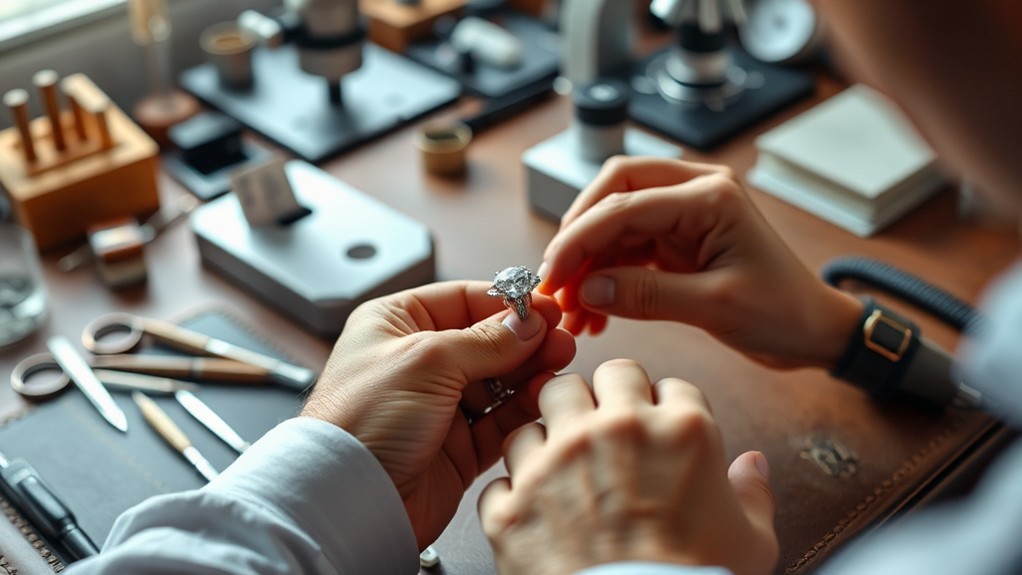
Building on the significance of proper documentation, let's investigate the different types of jewelry appraisals you might encounter.
A qualified appraiser can perform a range of assessments to determine the value of your precious items:
- General Appraisal: This detailed assessment requires proof of ownership, high-quality photographs, and thorough descriptions to accurately evaluate your jewelry's market value.
- Ring Appraisal: For rings, you'll need to provide specifics about the metal type, gemstone quality, and certification for any certified stones. These factors influence the ring's total worth.
- Watch Appraisal: When valuing timepieces, documentation of the brand, model, serial number, service history, and original packaging is key for establishing authenticity and determining value.
- Diamond Appraisal: GIA or equivalent certification is necessary for diamond evaluations. Grading reports offer significant details for a complete assessment of the stone's quality and value.
- Gemstone Appraisal: For other precious stones, certificates from reputable gemological labs are required to verify the type and characteristics of the gemstones being evaluated.
Each type of appraisal requires specific documentation and expertise to guarantee an accurate appraisal report, which is important for insurance purposes and determining the true value of your precious metals and gemstones.
The Appraisal Process
Understanding the appraisal process is vital for anyone seeking to value their jewelry accurately. When you submit your piece for assessment, the appraiser follows a systematic approach to determine its worth.
The process begins with an initial examination, where the expert carefully inspects the jewelry's condition and general characteristics.
Next, the appraiser evaluates the gemstones, considering the 4Cs: cut, clarity, color, and carat weight. This step is important for determining the quality and value of each stone. To assist in the evaluation process, the appraiser may also utilize a diamond carat weight calculator to ensure accuracy and precision in their assessment. This tool helps to determine the exact weight of each diamond, which is a critical factor in its overall value. By carefully examining each of the 4Cs and utilizing a diamond carat weight calculator, the appraiser can provide an accurate and thorough appraisal for each gemstone.
Following gemstone assessment, metal analysis takes place. The appraiser identifies the metal type, purity, and weight, which contribute greatly to the piece's inherent value.
Craftsmanship and design are then scrutinized, as these factors can greatly impact the jewelry's overall worth. The appraiser assesses the skill and artistry involved in creating the piece, considering factors such as complexity and uniqueness.
Factors Influencing Jewelry Value
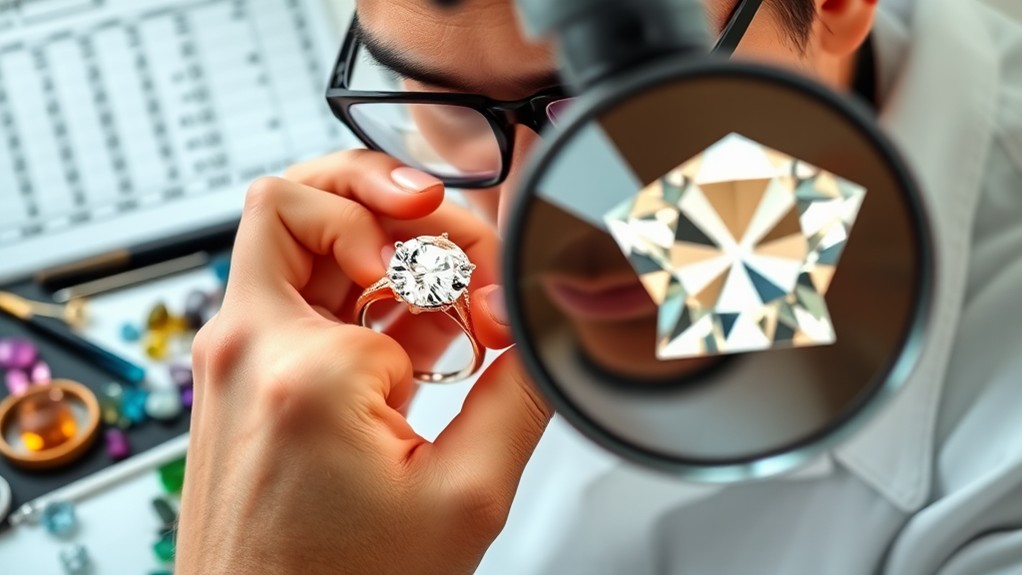
Numerous factors intertwine to shape a piece of jewelry's value. When conducting appraisals, professional appraisers consider a complex interplay of elements that influence the general worth.
The quality of materials plays an essential role, with precious metals and gemstones at the forefront. You'll find that higher purity in metals like gold and platinum, along with superior color, clarity, cut, and carat weight in gemstones, markedly enhance a piece's value.
The condition of jewelry is vital; well-maintained items command higher prices than those showing wear or damage.
Don't overlook the importance of craftsmanship and design, as unique or intricate pieces often fetch premium values. Historical significance and provenance can dramatically increase worth, especially for antique or vintage jewelry.
Market trends and current demand likewise sway valuations. You'll notice fluctuations based on popular styles or periods.
Consider these key factors influencing jewelry value:
- Quality and rarity of gemstones
- Purity of precious metals
- Craftsmanship and design
- Condition and age
- Historical significance
- Brand reputation
- Market demand and trends
Role of Written Appraisals
A written appraisal serves as a cornerstone in jewelry valuation, providing an official record of a piece's worth. When you seek an accurate assessment of your jewelry's value, a professional written appraisal is fundamental. This document offers a detailed description of your item, including gemstone quality, metal purity, and unique features, which are vital for establishing its true value.
For insurance purposes, a written appraisal is imperative. It provides documented proof of your jewelry's worth, helping prevent underinsurance in case of loss or theft.
Moreover, these appraisals play a significant role in estate planning, guaranteeing equitable distribution of assets among heirs and mitigating potential disputes.
If you're considering selling your jewelry, a written appraisal helps determine fair resale values. It allows you to establish appropriate asking prices and provides potential buyers with confidence in the item's worth.
To improve credibility and accuracy, obtain appraisals from certified experts. Their expertise guarantees that the valuation holds up under scrutiny for legal or insurance purposes, giving you peace of mind and a reliable assessment of your jewelry's true value.
Qualifications of Jewelry Appraisers
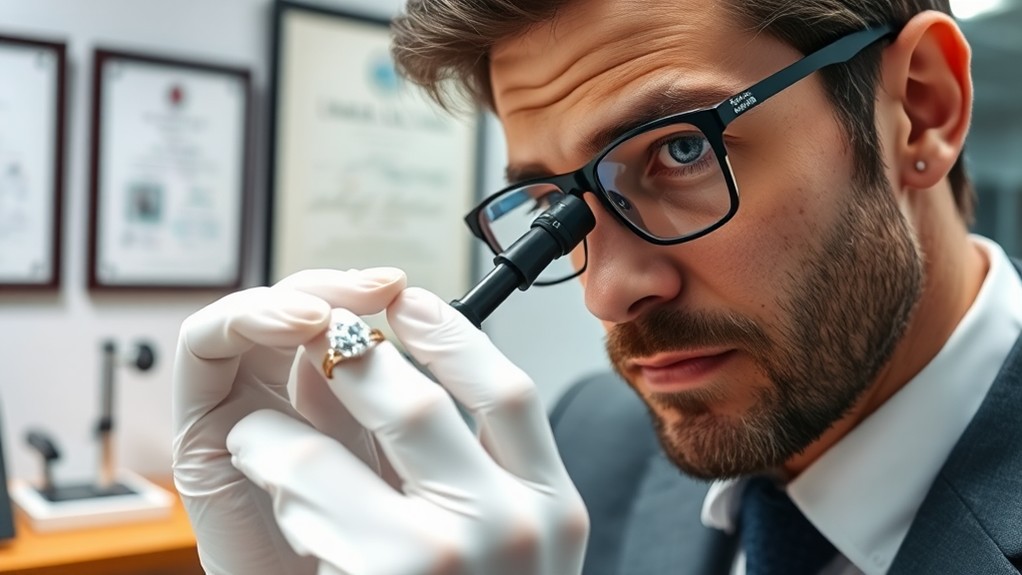
When you're seeking a jewelry appraisal, it's vital to choose a qualified professional. Certified jewelry appraisers typically hold qualifications from recognized institutions such as the Gemological Institute of America (GIA) or International Society of Appraisers (ISA). These credentials guarantee they've received specialized education in gemology and appraisal practices.
Look for appraisers who:
- Maintain memberships in professional organizations like the National Association of Jewelry Appraisers (NAJA)
- Adhere to strict ethical standards
- Demonstrate a deep understanding of gemstone grading (4Cs: Cut, Clarity, Color, Carat Weight)
- Stay updated on market trends and valuation methodologies
Qualified appraisers undergo rigorous training programs covering:
- Legal aspects of jewelry appraisal
- Precious metal purity assessment
- Current market demand analysis
Continuous professional development is vital in this field. Reputable appraisers regularly attend workshops and seminars to improve their skills and knowledge.
Current Trends in Appraisals
As the jewelry industry evolves, appraisal trends are shifting to reflect changing consumer preferences and market dynamics. In 2024, you'll find that current market trends are influencing how appraisers assess valuable pieces. The quality of gemstones and precious metals remains essential, but there's a growing emphasis on sustainable and ethically sourced materials.
Customization and personalization are likewise key factors in determining a piece's worth.
When seeking an appraisal, you should be aware of these emerging trends:
- Increased value placed on unique features and innovative designs, particularly in men's wedding bands
- Greater consideration of sustainable practices and ethical sourcing in jewelry production
- Rising importance of provenance and historical significance for vintage and antique pieces
The general condition of jewelry remains a significant factor, but appraisers are now paying more attention to contemporary styles, such as minimalist silver designs.
An up-to-date appraisal can help you understand how these market trends affect your jewelry's value. Keep in mind that appraisers must adapt to fluctuating consumer preferences, ensuring that your valuable pieces are accurately assessed in the context of current market dynamics.
Frequently Asked Questions
How Do I Find Out How Much My Inherited Jewelry Is Worth?
To determine your inherited jewelry's worth, you'll want to gather any existing documentation, seek a professional appraisal from certified gemologists, and research current market trends. Consider the piece's materials, craftsmanship, and potential historical significance for a thorough valuation.
How Much Should a Jewelry Appraisal Cost?
You'll typically pay $50 to $150 for a basic jewelry appraisal. Prices can rise to $300 for complex or antique pieces. Hourly rates range from $75 to $300. Consider the appraiser's credentials and your location when estimating costs.
How Do You Know if the Jewelry Appraiser Is Trustworthy?
To determine if a jewelry appraiser's trustworthy, you'll want to verify their credentials, check client reviews, make certain they provide detailed reports, offer transparent pricing, and have experience with your specific type of jewelry. Don't hesitate to ask questions.
How Do You Determine the Market Value of Jewelry?
To determine jewelry's market value, you'll consider gemstone quality, precious metal type, craftsmanship, and historical significance. Research comparable sales, consult professional appraisers, and stay informed about market trends. Don't forget to factor in current demand and economic conditions. You may also want to consider the reputation and credibility of the seller when determining the value of jewelry. For example, top places for selling pearls may include reputable jewelry stores, online marketplaces, and auction houses with a track record of high-value sales. Understanding the various factors that contribute to jewelry’s market value will help you make informed decisions when buying or selling precious pieces.
